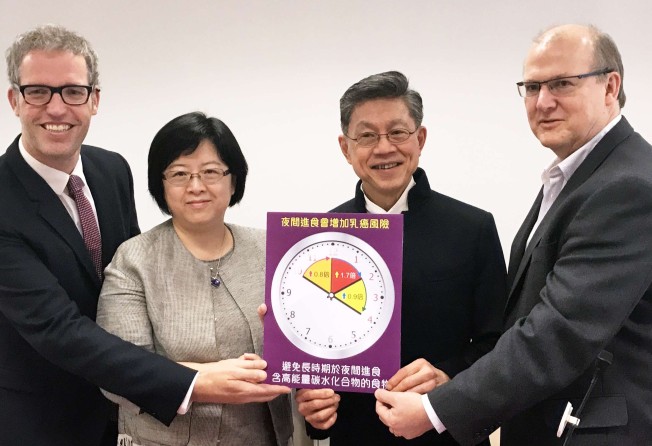Hong Kong scientists reveal link between late-night dinners and breast cancer
Risk of developing the disease increases by half among women who eat rice or noodles after 10pm

Women who eat rice or noodles after 10pm are more at risk of developing breast cancer, a study led by Chinese University revealed.
The risk increases by half if food is consumed after 10pm at least once a week for more than a year, compared to those women who never snack late at night.
Shelly Tse Lap-ah, associate professor at the university’s school of public health and one of the study authors, said the direct link between night eating and breast cancer was still unclear as the study only identified possible associations.
But previous studies suggested the habit might disrupt the neuroendocrine system, including reduction of melatonin, a hormone that helps to protect the body against ageing.
“If we eat late at night, our biological clock might reset and the [endocrine system] could be disrupted,” Tse said. “Chronic diseases could be caused if production of melatonin is suppressed.
“We could age and have poorer immunity.”
She said a study covering a longer period would be required to confirm a causal link between eating late at night and developing breast cancer.
Some 1,835 Hong Kong women from three public hospitals were questioned for the study between 2012 and 2015.
While the risk of developing breast cancer was found to be 1.79 times higher among those eating noodles and 1.58 times more for those eating rice late at night, the risk attached to eating fruit or vegetables was not significant.
“It is all right to eat some fresh fruit late at night if you get hungry,” Tse said.
The study also found that the riskiest time to eat between 10pm and 4am was from midnight to 2am, when women were 1.7 times more likely to be at risk of developing breast cancer.
Dr Francis Chow Chun-chung, head of the university’s division of endocrinology and diabetes, said that forcing the body to stay awake at night could lead to obesity and diabetes, which were risk factors for cancer.
“The body’s system that controls one’s appetite would stay more active and the ability to feel full would turn worse, therefore one tends to eat more,” Chow, who was not involved in the study, said.
“Obesity and diabetes are known to be related to many types of cancer, including breast, prostate and liver.”
According to latest data from the city’s cancer registry, breast cancer is the most common cancer among women in Hong Kong, with 3,868 new cases recorded in 2014.
It also ranked as the third most deadly cancer for women, killing 604 in the same year.